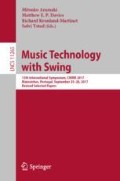Abstract
Listening to swinging music you often want to move along with the rhythm. - We pose the question: How might the production of microtiming that characterizes swing be modelled? A fundamental idea in the present paper is to apply an interaction of oscillators to achieve alterations of frequencies that create timing deviations that are typical of live performances of rhythm. - Dynamic, time-dependent features are introduced and implemented in a model based on rhythmic frequency modulation, RFM, previously developed by the authors of this paper. We here exemplify the potential of this new, extended model by simulating various performances of swing in jazz, and we also indicate how the computer implementation of the RFM model might be an interesting tool of electro-acoustic music. Moreover, we discuss our model construction within the framework of event-based and emergent timing.
Access this chapter
Tax calculation will be finalised at checkout
Purchases are for personal use only
Notes
- 1.
FMRhythm is written in C++ and available as open source at https://github.com/ssaue/FMrhythm. Currently only Windows is supported, but we intend to make it platform-independent.
- 2.
Specifications for MIDI and the Standard MIDI File format are available from the MIDI Manufacturers Association (MMA): https://www.midi.org/specifications.
References
Alén, O.: Rhythm as duration of sounds in tumba francesa. Ethnomusicology 39, 55–71 (1995)
Audio Realization of FM Rhythm Synthesis. http://folk.ntnu.no/sigurds/FMrhythm.html
Balasubramaniam, R., Wing, A.M., Daffertshofer, A.: Keeping with the beat: movement trajectories contribute to movement timing. Exp. Brain Res. 159, 129–134 (2004)
Benadon, F.: Slicing the beat: jazz eighth-notes as expressive microrhythm. Ethnomusicology 50(1), 73–98 (2006)
Bengtsson, I., Gabrielsson, A.: Analysis and synthesis of musical rhythm. In: Sundberg, J. (ed.) Studies of Music Performance. Publications Issued by the Royal Swedish Academy of Music, Stockholm, vol. 39, pp. 27–59 (1983)
Butler, M.J.: Unlocking the Groove: Rhythm, Meter, and Musical Design in Electronic Dance Music. Indiana University Press, Bloomington and Indianapolis (2006)
Butterfield, M.W.: Power of anacrusis: engendered feeling in groove-based musics. Music Theory Online 12, 4 (2006)
Butterfield, M.: Participatory discrepancies and the perception of beats in jazz. Music Percept. 27(3), 157–175 (2010)
Butterfield, M.W.: Why do jazz musicians swing their eighth notes? Music Theory Spectr. 33(1), 3–26 (2011)
Chowning, J.M.: The synthesis of complex audio spectra by means of frequency modulation. J. Audio Eng. Soc. 21, 526–534 (1973)
Clarke, E.F.: Rhythm and timing in music. In: Deutsch, D. (ed.) The Psychology of Music, 2nd edn, pp. 473–500. Academic Press, San Diego (1999)
Collier, G., Collier, J.: The swing rhythm in jazz. In: Pennycook, B., Costa-Giomi, E. (eds.) Proceedings of the 4th International Conference on Music Perception and Cognition, pp. 477–480. McGill University, Montreal, Canada (1996)
Delignières, D., Torre, K.: Event-based and emergent timing: dichotomy or continuum? a reply to Repp and Steinman (2010). J. Mot. Behav. 43(4), 311–318 (2011)
Frane, A.V.: Swing rhythm in classic drum breaks from hip-hop’s breakbeat canon. Music. Percept.: Interdiscip. J. 34(3), 291–302 (2017)
Friberg, A., Sundström, A.: Swing ratios and ensemble timing in jazz performance: evidence for a common rhythmic pattern. Music. Percept. 19, 333–349 (2002)
Honing, H., Haas, W.B.De: Swing once more: relating timing and tempo in expert jazz drumming. Music Percept. 25(5), 471–476 (2008)
Keil, C.: The theory of participatory discrepancies: a progress report. Ethnomusicology 39, 1–19 (1995)
Kirke, A., Miranda, E.R. (eds.): Guide to Computing for Expressive Music Performance. Springer, London (2013). https://doi.org/10.1007/978-1-4471-4123-5
Mcguiness, A.: Modelling microtiming beat variations with pulse-coupled oscillators. Timing Time Percept. 3(1–2), 155–171 (2015)
Moelants, D.: The performance of notes inégales: the influence of tempo, musical structure, and individual performance style on expressive timing. Music Percept. 28(5), 449–460 (2011)
Prögler, J.A.: Searching for swing: participatory discrepancies in the jazz rhythm section. Ethnomusicology 39, 21–54 (1995)
Repp, B.H., Steinman, S.R.: Event-based and emergent timing: synchronization, continuation, and phase correction. J. Mot. Behav. 42(2), 111–126 (2010)
Saue, S.: Implementing rhythmic frequency modulation. In: Waadeland, C.H. Rhythmic Movements and Moveable Rhythms – Syntheses of Expressive Timing by Means of Rhythmic Frequency Modulation (Thesis), pp. 252–276. NTNU, Trondheim (2000)
Schuller, G.: The Swing Era: The Development of Jazz 1930–1945. Oxford University Press, New York (1989)
Seashore, C.E.: Psychology of Music. McGraw-Hill, New York (1938)
Viviani, P.: Common factors in the control of free and constrained movements. In: Jeannerod, M. (ed.) Attention and Performance XIII, 345373. Lawrence Erlbaum Associates, Publication (1990)
Waadeland, C.H.: “It Don’t Mean a Thing If It Ain’t Got That Swing” - Simulating expressive timing by modulated movements. J. New Music. Res. 30, 23–37 (2001)
Waadeland, C.H.: Strategies in empirical studies of swing groove. Studia Musicologica Norvegica 32, 169–191 (2006)
Waadeland, C.H.: Synthesis of asymmetric movement trajectories in timed rhythmic behaviour by means of frequency modulation. Hum. Mov. Sci. 51, 112–124 (2017)
Acknowledgements
The authors are grateful to the anonymous reviewers for their valuable comments and suggestions.
Author information
Authors and Affiliations
Corresponding author
Editor information
Editors and Affiliations
Rights and permissions
Copyright information
© 2018 Springer Nature Switzerland AG
About this paper
Cite this paper
Waadeland, C.H., Saue, S. (2018). Modulated Swing: Dynamic Rhythm Synthesis by Means of Frequency Modulation. In: Aramaki, M., Davies , M., Kronland-Martinet, R., Ystad, S. (eds) Music Technology with Swing. CMMR 2017. Lecture Notes in Computer Science(), vol 11265. Springer, Cham. https://doi.org/10.1007/978-3-030-01692-0_10
Download citation
DOI: https://doi.org/10.1007/978-3-030-01692-0_10
Published:
Publisher Name: Springer, Cham
Print ISBN: 978-3-030-01691-3
Online ISBN: 978-3-030-01692-0
eBook Packages: Computer ScienceComputer Science (R0)

